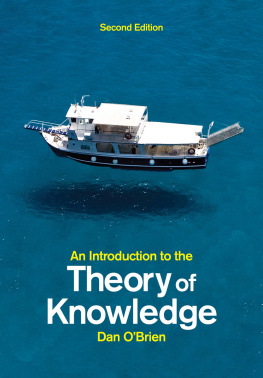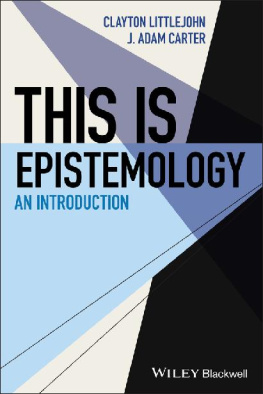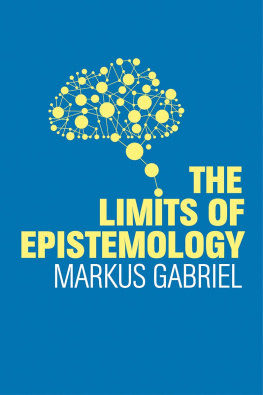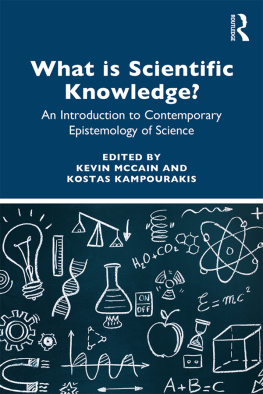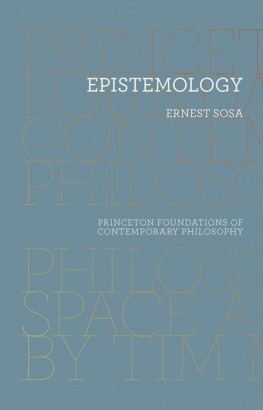Contents
Guide
Pages

Dedication
For Mont
An Introduction to the Theory of Knowledge
Second Edition
DAN OBRIEN
polity
Copyright Dan OBrien 2017
The right of Dan OBrien to be identified as Author of this Work has been asserted in accordance with the UK Copyright, Designs and Patents Act 1988.
First published in 2006 by Polity Press
This edition published in 2017 by Polity Press
Polity Press
65 Bridge Street
Cambridge CB2 1UR, UK
Polity Press
350 Main Street
Malden, MA 02148, USA
All rights reserved. Except for the quotation of short passages for the purpose of criticism and review, no part of this publication may be reproduced, stored in a retrieval system, or transmitted, in any form or by any means, electronic, mechanical, photocopying, recording or otherwise, without the prior permission of the publisher.
ISBN-13: 978-1-5095-1240-9
A catalogue record for this book is available from the British Library.
Library of Congress Cataloging-in-Publication Data
Names: OBrien, Dan, 1968- author.
Title: An introduction to the theory of knowledge / Dan OBrien.
Description: 2 edition. | Malden, MA : Polity Press, 2016. | Includes bibliographical references and index.
Identifiers: LCCN 2016021682| ISBN 9780745664316 (hardback) | ISBN 9780745664323 (pbk.)
Subjects: LCSH: Knowledge, Theory of.
Classification: LCC BD161 .O27 2016 | DDC 121--dc23 LC record available at https://lccn.loc.gov/2016021682
The publisher has used its best endeavours to ensure that the URLs for external websites referred to in this book are correct and active at the time of going to press. However, the publisher has no responsibility for the websites and can make no guarantee that a site will remain live or that the content is or will remain appropriate.
Every effort has been made to trace all copyright holders, but if any have been inadvertently overlooked the publisher will be pleased to include any necessary credits in any subsequent reprint or edition.
For further information on Polity, visit our website: politybooks.com
Preface to the Second Edition
This book is intended for those following introductory undergraduate modules in Epistemology or the Theory of Knowledge, and for those studying the Theory of Knowledge component of the Philosophy A and AS level and the International Baccalaureate. I hope, though, that its readership is wider. Epistemology is one of the central areas of philosophy and anyone with an interest in philosophy would hopefully find this book rewarding.
Throughout the book I have used examples from literature and film (particularly the latter). Knowledge of films and novels is often common currency, and in lectures and seminars this can lead to animated discussion of the philosophical aspects of the plot or characterization of a particular work. Such cross-fertilization should be encouraged. Philosophy should not be seen as a dry academic discipline divorced from everyday life. There are times in its history when this has been the case: there is the clichd image of medieval philosophers using arcane arguments to determine how many angels could stand on a pinhead. And, if you turn to certain contemporary journals, you will find that many research papers are just as inaccessible and idiosyncratic. There is a danger of philosophy becoming professionalized; inaccessible and uninteresting to those outside of university philosophy departments. The philosophical problems at which we shall look are ones concerning knowledge that everyday notion and these are problems that have been discussed for thousands of years, problems that can be illuminated by the great philosophers of the past such as Plato, Descartes and Hume, and by looking at the works of writers and filmmakers who are themselves exercised, perhaps indirectly, by the very same issues.
Questions are included at the end of each chapter to encourage you to engage critically with the material. (Instructors could use these as essay questions or as discussion topics in seminars.) And, as you progress through the book, you should be thinking up your own examples and counterexamples, assessing whether the arguments discussed are good ones, and reflecting on whether you understand the various issues and concepts that are presented. You should also note that there is a Glossary included at the end of the book in which certain key terms are explained; these terms are flagged in bold when they first appear.
In general I have tried to be neutral, not advocating a particular epistemological theory, and presenting the reader with various alternative responses to the problems that we discuss. In places, though, my preference for a certain approach may show through. This, however, is not a bad thing. First, a consistent attempt not to endorse a particular position can lead to a lot of hedging: too much seems to, can be seen as, some have argued that . This can be stylistically clumsy. Second, you should always bear in mind that these debates are very much alive and, in places, you can and should disagree with me; in doing so, you are being a philosopher.
I would like to thank certain friends who read and commented on complete drafts of the book. Bernadette Evans suggested various stylistic and substantive changes to the text, and had a keen eye for inconsistencies (for where, as Lou Reed would say, he was a she). Discussions with Dr Martin Hall have shaped much of the book, particularly we have been arguing over foundationalism for almost a decade now. Particular thanks to Matthew Gidley since, not being a philosopher, he claimed not to understand a word of the book and, throughout his editing, to have the expression of a dog thats just been told a joke. (This is actually a very Wittgensteinian line, although I mustnt tell him this as he already calls the book an extended argument for National Service.) Various readers of the Philos-L mailing list suggested useful examples, and thanks to Max Kolbel, Lawrence Goldstein and Rob Hopkins for commenting on particular chapters. Thanks also to Elizabeth Molinari, Ellen McKinlay, Emma Hutchinson, Andrea Drugan and John Thompson at Polity and to two anonymous reviewers. This book would not have been written but for the encouragement and support of Greg McCulloch and Harold Noonan during my postgraduate study. Most influential to my interest in epistemology and to much of the content of the book have been my students. The Theory of Empirical Knowledge could, I admit, sound rather dry less engaging than Existentialism, perhaps, or the Philosophy of Mind, or Aesthetics but the interest shown by a great many of these students, and their contributions in class, have made this module, dare I say it, fun. This book hopes to carry on in the spirit of these classes.
Its now almost exactly ten years on from the night I was completing the manuscript of what was my first book. On reading the first edition again it was surprising to see how certain things had dated and how some examples were now stale. Thus, for the second edition, David Beckham, Michael Owen and John McEnroe had to go fame is short. My references to The Internet and the World Wide Web also carried a sense that these were new and exciting, that I had just discovered that they may be useful for academic study, and the fear that one could be led astray by the evil Wikipedia. All this seems rather quaint now.
Something else I did not expect was how nostalgic the process became. Many of my examples are autobiographical and reading it again brought back my life of a decade ago my persistent colds (we now have central heating), the sound of lorries from the supermarket behind the flat where I used to live, and my Saturday morning breakfasts of chana puri. The battered blue corduroys are now no more, but the red hole punch is still on my desk an apt madeleine for an academic. From the new additions you may deduce that I have now moved to the suburbs: gardening and neighbours taking the place of bars and concerts.

